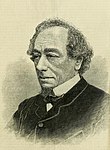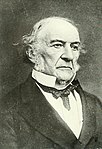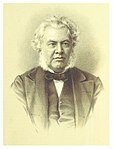1874 United Kingdom general election
| |||||||||||||||||||||||||||||||||||||||||||||||||
All 652 seats in the House of Commons 327 seats needed for a majority | |||||||||||||||||||||||||||||||||||||||||||||||||
|---|---|---|---|---|---|---|---|---|---|---|---|---|---|---|---|---|---|---|---|---|---|---|---|---|---|---|---|---|---|---|---|---|---|---|---|---|---|---|---|---|---|---|---|---|---|---|---|---|---|
| |||||||||||||||||||||||||||||||||||||||||||||||||
 Colours denote the winning party | |||||||||||||||||||||||||||||||||||||||||||||||||
| |||||||||||||||||||||||||||||||||||||||||||||||||
The 1874 United Kingdom general election saw the incumbent Liberals, led by William Ewart Gladstone, lose decisively, even though it won a majority of the votes cast. Benjamin Disraeli's Conservatives won the majority of seats in the House of Commons, largely because they won a number of uncontested seats. It was the first Conservative victory in a general election since 1841. Gladstone's decision to call an election surprised his colleagues, for they were aware of large sectors of discontent in their coalition. For example, the nonconformists were upset with education policies; many working-class people disliked the new trade union laws and the restrictions on drinking. The Conservatives were making gains in the middle-class, Gladstone wanted to abolish the income tax, but failed to carry his own cabinet. The result was a disaster for the Liberals, who went from 387 MPs to only 242. Conservatives jumped from 271 to 350. For the first time the Irish Nationalists gained seats, returning 60. Gladstone himself noted: "We have been swept away in a torrent of gin and beer" (Roberts 2001, p. 332).
The election also saw Irish nationalists in the Home Rule League become the first significant third party in Parliament. This had been the first general election that used a secret ballot following the 1872 Secret Ballot Act. The Irish Nationalist gains could well be attributed to the effects of the Secret Ballot Act as tenants faced less of a threat of eviction if they voted against the wishes of their landlords.
This is the only time since the introduction of the secret ballot that a party has been defeated despite receiving an absolute majority of the popular vote. This was primarily because over 100 Conservative candidates were elected unopposed. This meant that there was no contest in many constituencies where the Conservatives were popular.
The election saw 652 MPs elected: 6 fewer than at the prior election. Following allegations of corruption the Conservative held constituencies of Beverley and Sligo Borough, and the Liberal held constituencies of Bridgwater and Cashel, had been abolished.
|
|
|
|
|
Contents
1 Results
1.1 Voting summary
1.2 Seats summary
1.3 Regional results
1.3.1 Great Britain
1.3.1.1 England
1.3.1.2 Scotland
1.3.1.3 Wales
1.3.2 Ireland
1.3.3 Universities
2 Notes
3 References
Results
| UK General Election 1874 | |||||||||||||||
|---|---|---|---|---|---|---|---|---|---|---|---|---|---|---|---|
| Party | Candidates | Votes | |||||||||||||
| Stood | Elected | Gained | Unseated | Net | % of total | % | № | Net % | |||||||
| | Liberal | 489 | 242 | −139 | 37.12 | 51.95 | 1,281,159 | −9.5 | |||||||
| | Conservative | 507 | 350 | +79 | 53.68 | 44.27 | 1,091,708 | +5.9 | |||||||
| | Home Rule | 80 | 60 | 0 | 0 | +60 | 9.20 | 3.66 | 90,234 | N/A | |||||
| | Others | 4 | 0 | 0 | 0 | 0 | 0 | 0.12 | 2,936 | 0.0 | |||||
Voting summary
Seats summary
Regional results
Great Britain
| Party | Seats | Seats change | Votes | % | % change | |
|---|---|---|---|---|---|---|
Conservative | 319 | 1,000,006 | 44.6 | |||
Liberal | 232 | 1,241,381 | 55.4 | |||
| Other | 0 | 2 | 0.0 | |||
| Total | 551 | 2,241,389 | 100 | |||
England
| Party | Seats | Seats change | Votes | % | % change | |
|---|---|---|---|---|---|---|
Conservative | 280 | 905,239 | 46.2 | |||
Liberal | 171 | 1,035,268 | 53.8 | |||
| Other | 0 | 2 | 0.0 | |||
| Total | 451 | 1,940,509 | 100 | |||
Scotland
| Party | Seats | Seats change | Votes | % | % change | |
|---|---|---|---|---|---|---|
Liberal | 40 | 148,345 | 68.4 | |||
Conservative | 18 | 63,193 | 31.6 | |||
| Total | 58 | 211,538 | 100 | |||
Wales
| Party | Seats | Seats change | Votes | % | % change | |
|---|---|---|---|---|---|---|
Liberal | 19 | 57,768 | 60.9 | |||
Conservative | 14 | 31,574 | 39.1 | |||
| Total | 33 | 89,342 | 100 | |||
Ireland
| Party | Seats | Seats change | Votes | % | % change | |
|---|---|---|---|---|---|---|
Home Rule | 60 | 90,234 | 39.6 | |||
Irish Conservative | 31 | −6 | 91,702 | 40.8 | −1.1% | |
Liberal | 10 | −56 | 39,778 | 18.4 | −39.5% | |
| Other | 0 | 2,934 | 1.2 | |||
| Total | 101 | −2 | 224,648 | 100 | ||
Universities
| Party | Seats | Seats change | Votes | % | % change | |
|---|---|---|---|---|---|---|
Conservative | 7 | |||||
Liberal | 2 | |||||
| Total | 9 | 100 | ||||
Notes
^ "Others" include the Catholic Union.
References
.mw-parser-output .refbegin{font-size:90%;margin-bottom:0.5em}.mw-parser-output .refbegin-hanging-indents>ul{list-style-type:none;margin-left:0}.mw-parser-output .refbegin-hanging-indents>ul>li,.mw-parser-output .refbegin-hanging-indents>dl>dd{margin-left:0;padding-left:3.2em;text-indent:-3.2em;list-style:none}.mw-parser-output .refbegin-100{font-size:100%}
Craig, F. W. S. (1989), British Electoral Facts: 1832–1987, Dartmouth: Gower, ISBN 0900178302.mw-parser-output cite.citation{font-style:inherit}.mw-parser-output .citation q{quotes:"""""""'""'"}.mw-parser-output .citation .cs1-lock-free a{background:url("//upload.wikimedia.org/wikipedia/commons/thumb/6/65/Lock-green.svg/9px-Lock-green.svg.png")no-repeat;background-position:right .1em center}.mw-parser-output .citation .cs1-lock-limited a,.mw-parser-output .citation .cs1-lock-registration a{background:url("//upload.wikimedia.org/wikipedia/commons/thumb/d/d6/Lock-gray-alt-2.svg/9px-Lock-gray-alt-2.svg.png")no-repeat;background-position:right .1em center}.mw-parser-output .citation .cs1-lock-subscription a{background:url("//upload.wikimedia.org/wikipedia/commons/thumb/a/aa/Lock-red-alt-2.svg/9px-Lock-red-alt-2.svg.png")no-repeat;background-position:right .1em center}.mw-parser-output .cs1-subscription,.mw-parser-output .cs1-registration{color:#555}.mw-parser-output .cs1-subscription span,.mw-parser-output .cs1-registration span{border-bottom:1px dotted;cursor:help}.mw-parser-output .cs1-ws-icon a{background:url("//upload.wikimedia.org/wikipedia/commons/thumb/4/4c/Wikisource-logo.svg/12px-Wikisource-logo.svg.png")no-repeat;background-position:right .1em center}.mw-parser-output code.cs1-code{color:inherit;background:inherit;border:inherit;padding:inherit}.mw-parser-output .cs1-hidden-error{display:none;font-size:100%}.mw-parser-output .cs1-visible-error{font-size:100%}.mw-parser-output .cs1-maint{display:none;color:#33aa33;margin-left:0.3em}.mw-parser-output .cs1-subscription,.mw-parser-output .cs1-registration,.mw-parser-output .cs1-format{font-size:95%}.mw-parser-output .cs1-kern-left,.mw-parser-output .cs1-kern-wl-left{padding-left:0.2em}.mw-parser-output .cs1-kern-right,.mw-parser-output .cs1-kern-wl-right{padding-right:0.2em}
Hurst, Michael (1972), "Liberal versus Liberal: The General Election of 1874 in Bradford and Sheffield", Historical Journal, 15 (4): 669–713
Maehl, William Henry (1963), "Gladstone, the Liberals, and the Election of 1874", Historical Research, 36 (93): 53–69
Rallings, Colin; Thrasher, Michael, eds. (2000), British Electoral Facts 1832–1999, Ashgate Publishing Ltd
Roberts, Martin (2001), Britain: 1846–1964: The Challenge of Change, Oxford University Press


